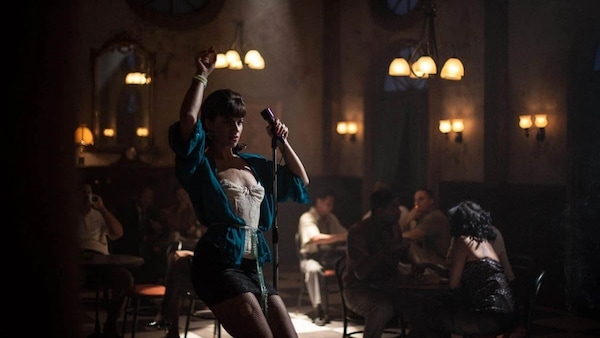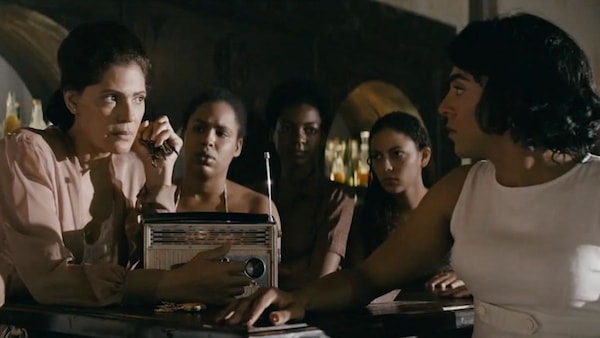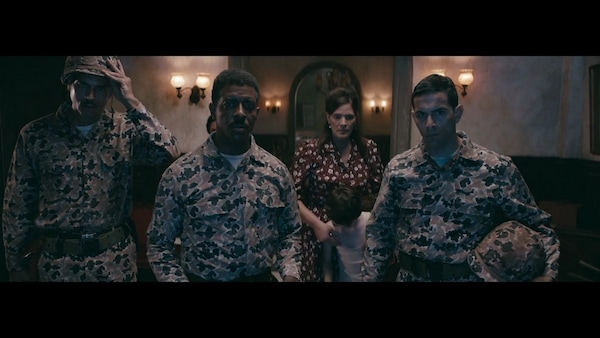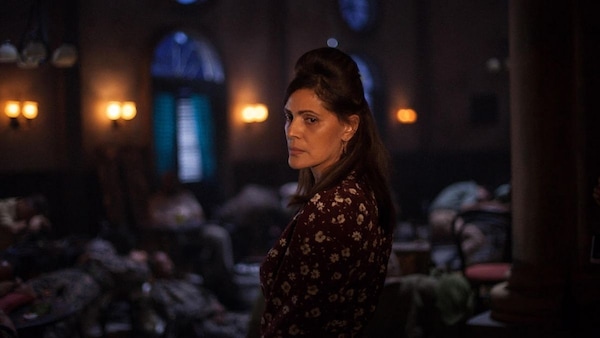Hotel Coppelia movie review: A compelling story of unity in the face of strife
The lives of a group of sex workers at a seaside brothel in the Dominican Republic change drastically when American troops invade the region during the 1965 civil war. Torn between fear and bravery, how will these women react to the arduous circumstances?

Last Updated: 09.11 AM, Nov 26, 2021
Story:
The roads of revolution and the fight for freedom require personal sacrifices and acts of heroism from all quarters. Hotel Coppelia (2021) gives a fitting tribute to the people, mainly women, who were vital during the 1965 freedom struggle in the Dominican Republic, but were conveniently forgotten by history. The film is set against the backdrop of the Dominican civil war and traces the lives of a group of sex workers, led by matron Judith (played by Lumi Lizardo), in a brothel in Santo Domingo.
Review:
Hotel Coppelia boasts a fantastic group of actors like Lumi Lizardo, Cyndie Lundi, Jazz Vilá, Nick Searcy, and the Platino Award-nominated actress Nashla Bogaert.
The film opens with Marie (played by Cyndie Lundi) aborting a foetus as the other girls hunch around her to help her through the difficult but necessary process. The matron Judith acts as a manager more than a mother to the prostitutes and is in charge of the brothel. She sets strict rules and expects the troupe to follow them with precision. Lizardo delivers a sober and intense performance as the humourless patriot who is true to her principles. Although she is not cruel, she is uncompromising and cold, with a past as painful as that of her girls. It is impossible to not adore the character of Gloria (played by Nashla Bogaert) as she pines for love or at least a fleeting moment of intimate connection. Her innocence and authenticity serve as the emotional thread in director José María Cabral’s narration.

The lives of these women take a dramatic turn when a group of revolutionaries prepare a strategy to defend the country from invasion and decide to use the brothel as a base of operation. Most of the sex workers quit, customers disappear, and the rebels take over, and even then, the troubles have only just begun.
Judith is not interested in the impending civil war and the political situation of her country. She wants these men out of her brothel and her customers back. Meanwhile, things take a turn for the worse when the US military invades the region in their attempt to quash the revolution. The Americans use the hotel as their military base. Judith and the remaining women are left at their mercy and reduced to cooking, cleaning, and other “free services” in exchange for their lives.

The simplistic yet poignant cinematography beautifully captures the loneliness and dread of the prostitutes as they await their fate.
The director keeps us within the confines of the brothel that Judith and her girls occupy, and we are rarely afforded glimpses at other parts of the city. Cabral paints a detailed picture of the tortures that these women endured and allows the audience to deeply relate to their actions and decisions. Most of the film’s visual effects and imagery takes place at night. The impeccable camerawork finds colour and texture in the shadows as the darkness is illuminated by soft lights and candles. The battle scenes and the hand-to-hand conflicts are also beautifully depicted.

Verdict:
Hotel Coppelia is not a perfect film, but it gives a different and necessary perspective of those who might, unfortunately, be trapped in such places and circumstances. The film explores a myriad of conflicting emotions when one is torn between fear and bravery, while others remain selfish to protect what they have worked for. Although it feels a bit too predictable and the narrative too abrupt, Hotel Coppelia does a great job of focussing on the lives of those who have been forgotten.

 Premium
Premium